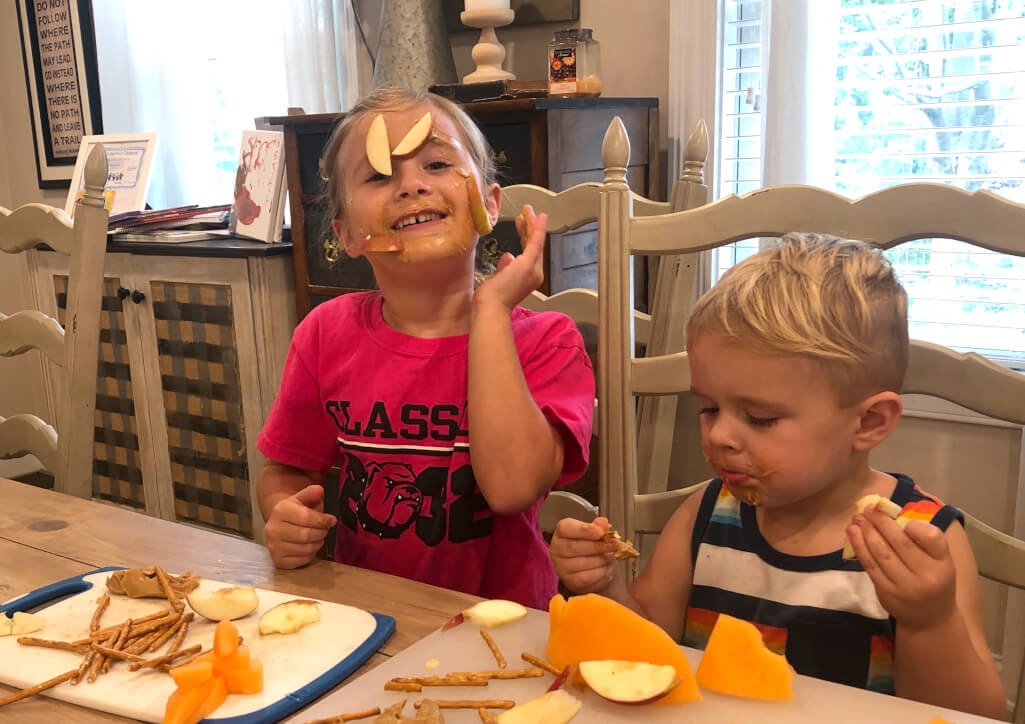Feeding Therapy
Feeding therapy focuses on helping a child learn how to eat and/or expand the variety of developmentally appropriate foods in their repertoire. A therapist will first evaluate your child’s feeding skills including chewing, drinking, and ability to self-feed, as well as food preferences. The therapist will collaborate with your family in order to provide feeding strategies that make mealtimes successful and positive for everyone.

Would my child benefit from feeding therapy?
The more questions you answer yes to, the more likely your child is to benefit from feeding therapy.
Is your child:
- Not eating a variety of foods from all food groups or avoiding entire food groups?
- Not eating an appropriate volume within a reasonable timeframe?
- Refusing foods and engaging in avoidance behaviors (e.g., tantruming, throwing food, screaming, won’t sit at the table)?
- Not growing well?
- Gagging or vomiting while eating?
- Only eating certain textures of food (e.g., purees, crunchy solids, fluids)?
- Eating less than 20 foods consistently?
- Eliminating foods previously eaten consistently and not replacing them?
- Not self-feeding (e.g. drinking from a cup, using utensils) as would be expected for his/her age?
- Having difficulty transitioning from tube to oral feeding?
- Aspirating, coughing or choking while eating or shortly after eating?
- Having difficulty weaning from a bottle to solid foods?
Feeding therapy can address a variety of issues, including:
- Improving sensory tolerance to various food textures
- Developing chewing skills
- Increasing variety and volume of nutritional intake to include all food groups and textures
- Reducing avoidance behaviors during mealtimes
- Teaching self-feeding skills including drinking from a cup and using utensils
Our feeding therapists work with families to promote home generalization of skills by including parents in therapy sessions, modeling strategies to use in the home environment, and making recommendations specific to each child’s skills and goals.
The earlier you begin working with a feeding therapist, the faster you will see changes. It is much easier to change a 2-year old’s relationship to food than a 12-year old’s. However, feeding therapy can make mealtime more enjoyable for people of all ages, even adults!
Methodology
The SOS (sequential-oral-sensory) Approach to Feeding developed by Dr. Kay Toomey uses play, steps to eating and research to guide therapy. The SOS Approach focuses on increasing a child’s comfort level with food by exploring and learning about the different properties of food. There are many steps to eating, it does not begin at the mouth, but starting with our eyes and being able to look at a food (or be in the same room). Then we learn to interact with it without directly touching it, like using a utensil. Next, we smell it, then we touch it with our fingers, hands, body and mouth. Tasting involves touching food with the tip of our tongue, full tongue lick, biting and spitting out and finally biting and chewing. The SOS Approach allows a child to interact with food in a playful, non-stressful way that is comfortable for them.
Clinicians
Nicole Zwiep – Occupational Therapist, Feeding Specialist
Nicole Zwiep has completed extensive training in the SOS Approach including advanced workshops in reflux, infants and toddlers, children on the autism spectrum, food scientist for older children, and children with severe developmental impairments. In addition, she has completed the advanced-level SOS Mentorship course. With the SOS Approach, eating does not begin at the mouth, first a child must tolerate the physical presence of food, next interacting without touching the food, then managing the smell, touching with hands, body and mouth. Finally, tasting and then chewing and swallowing.
For more information or to discuss your child, please complete the Feeding Questionnaire and email to Caroline Brinkert – Director of Speech-Language and Occupational Therapies at Leanne Holland, M.S. CCC-SLP at lholland@iccdpartners.org.
Feeding History Questionnaire


